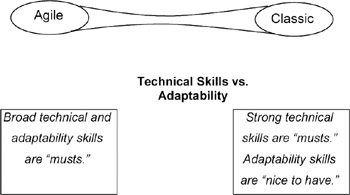Technical Skills Versus Adaptability
When assembling a classic project team, the project manager or sponsor will generally rank technical skills as the number-one requirement for hiring a new team member. Soft skills, such as flexibility and adaptability, are not make-or-break hiring criteria, though they may act as a tiebreaker between two candidates with identical technical skills. This makes sense because once the primary planning process is complete, project execution becomes dominant, and that's when having the right technical resources counts. The key here, though, is that in the classic environment, the project plan (including resource requirements) is generally stable.
In the agile environment, the large amount of uncertainty produces frequent changes in the plan, so project teams must be flexible enough to deal with these direction changes in an efficient manner. This fact alone elevates the importance of "adaptability" on the hiring criteria spectrum (see Figure 6-1). To take this thought one step further into the agile realm, consider that a single change in the project plan could obviate the need for a particular type of expertise altogether. If you've just hired someone with that specific expertise, and only that expertise, then you've got a problem. What are you going to do with that person? Hopefully, the people you hire are adaptable in both attitude and skills. By attitude, I mean that they are willing to work in areas outside of their primary expertise for the benefit of the team (many people refuse to do this). And, of course, they should have actual skills in other areas that will benefit the team.

Figure 6-1: The hiring criteria in an agile versus classic project management.
When selecting people for your agile team, you really want people who have broad technical skills and an attitude of adaptability. This combination of skills gives you the best chance of weaving them into the agile project team, as well as having them make meaningful and enthusiastic contributions.
This idea of adaptability may be so important in some agile projects that candidates with strong adaptability skills can arguably be elevated above those with superior technical skills. Those people who can develop and nourish the network of ideas and activities that make up the agile project are the core of your project team. They must, by definition, have broad skills and demonstrate adaptiveness for the simple reason that they are tasked with performing so many different functions. These functions include pulling together information from many sources, organizing it in the context of the project, and then turning it into the next steps that will move the project forward. Another way to look at it is that purely technical skills can be outsourced to any number of firms or free agents, but your core team cannot.
| Agile Strategy | Outsource specific technical activities that are not necessarily hubs in the network of the project plan, and therefore are purely support for the rest of the project. |
Developing a high-performing team is never easy, but it can be exhilarating if you are successful. The agile project environment presents its own unique challenges in the team-building area. Hopefully, you've gained some ideas that will help your team move to the next level.
EAN: 2147483647
Pages: 96